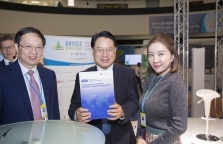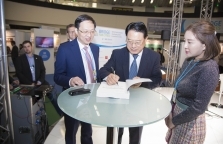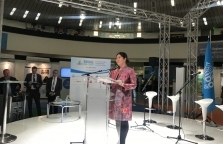On September 26, 2017, the first South-South Cooperation Annual Report was formally published on the 2nd “Belt and Road Initiative: Developing Green Economies for Cities” event at the United Nations Office in Vienna. Named as “Changing Roles of South-South Cooperation in the Global Development System towards 2030”, the report analyzes the historical process and the latest trendsof South-South cooperation from three aspects: namely the concept, system and practice. Mr. Cai E-sheng, Chairman of Finance Center for South-South Cooperation, wrote the foreword, while Mr. Jorge Chediek, Envoy of the United Nations Secretary-General on South-South Cooperation and Director of the United Nations Office for South-South Cooperation (UNOSSC), wrote the congratulatory message. At the launching ceremony, Mr. Li Yong, Director-General of the United Nations Industrial Development Organization (UNIDO), specially signed his congrats to the report. Madam Wang Xiaojun, UNOSSC’s Deputy Director, read Mr. Chediek’s message during the ceremony, witnessed by Dr. John Wu, Vice President and Director-General of Finance Center for South-South Cooperation (FCSSC) and Ms. Jenny Yao, FCSSC’s Deputy Director.
“Since the United Nations passed the‘2030 Agenda for Sustainable Development’in 2015, the global society has been active in fighting against poverty, climate change and inequality,” said Dr. Wu. He further mentioned that, in order to promote the 17 goals of sustainable development, developing countries have adopted a variety of global or regional operations, including the“Belt and Road Forum for International Cooperation”in Beijing this May, the annual BRICs summit, and the establishment of Asian Infrastructure Investment Bank (AIIB). “The aim ofSouth-South Cooperation Annual Reportis to record the efforts made by South-South countries to sustainable development, summarize their practical experience, and explore the future of the global South.”
Sponsored by South South Education Foundation (SSEF), the report is edited by FCSSC and Peking University. In the format of think tank research, the report is a symposium written by renowned international scholars, such as Prof. Justin Yifu Lin as the Director of Centre for News Structural Economics in Peking University and former World Bank Chief Economist and Senior Vice President, Prof. Sachin Chaturvedi as the Director-General of Research and Information System for Developing Countries (RIS), Prof. Chris Alden from London School of Economics and Political Science, Dr. Jing Gu as the Director of the Centre for Rising Powers and Global Development in the University of Sussex, Mr. Richard Carey as the former Chairman of OECD Development Assistance Commission, as well as Prof. Carlos Milani, Dr. Ross Anthony and Dr. Biswa Nath Bhattacharyay
The report is composed of three parts, which firstly reviews those great changes after the World War II, especially the transition of South-South cooperation from a “post-colonial” political vision to an important engine of economic development in the global Southin more than half a century after the Bandung Conference, with cooperation expanding to the fields of politics, economy, technology, society, and culture. What’s more, the appearance of BRICs and “Belt-and-Road Initiative”, representatives of new development cooperation mechanisms, has injected new impetus to South-South cooperation. Secondly, the report introduces the new structure economics, theoretical innovation on SEZ economics, and future opportunities of global development finance, based on the analysis of traditional economics. Finally, in order to assess the global practice of South-South cooperation, the report conducts case studies on China-Africa development cooperation, as well asrespective development cooperation in Brazil, India and South Africa.
“This report is a timely contribution as the international community prepares to commemorate the 40th anniversary of the Buenos Aires Plan of Action for Cooperation among Developing Countries with a UN High-level Conference on South-South Cooperation. It’s therefore a very useful compilation of knowledge on South-South cooperation from concept to practice,” writtenby Mr. Chediek in the congratulatory message.



